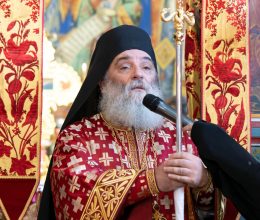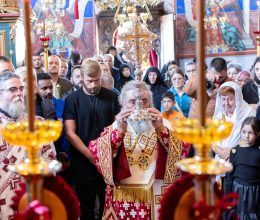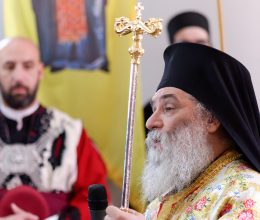Sermon by His Eminence, Bishop of Antania Mr Parthenius, delivered on Christmas Eve in the grand monastic Guest Hall, during the event of singing Christmas carols.
Venerable Fathers,
Reverend monks and nuns,
Dear brothers and sisters in Christ,,
Welcome to our Holy Monastery on the eve of one of the greatest Christian holidays, the Metropolis of feasts – the Nativity of our Savior, Lord Jesus Christ, the eternal God Logos, Who abides in eternity together with God the Father and the Holy Spirit, and Who was born in time from the pure Virgin Mary. The Son of God voluntarily emptied Himself of His glory, His divinity, and condescending to fallen man, took human flesh from the Most Holy Theotokos, the purest among people since the creation of the world. The Immaculate Virgin was honored to bring to us the pre-eternal God, Who became one of us, in all things like us, except for sin and Who visited us in our nature to save us all.
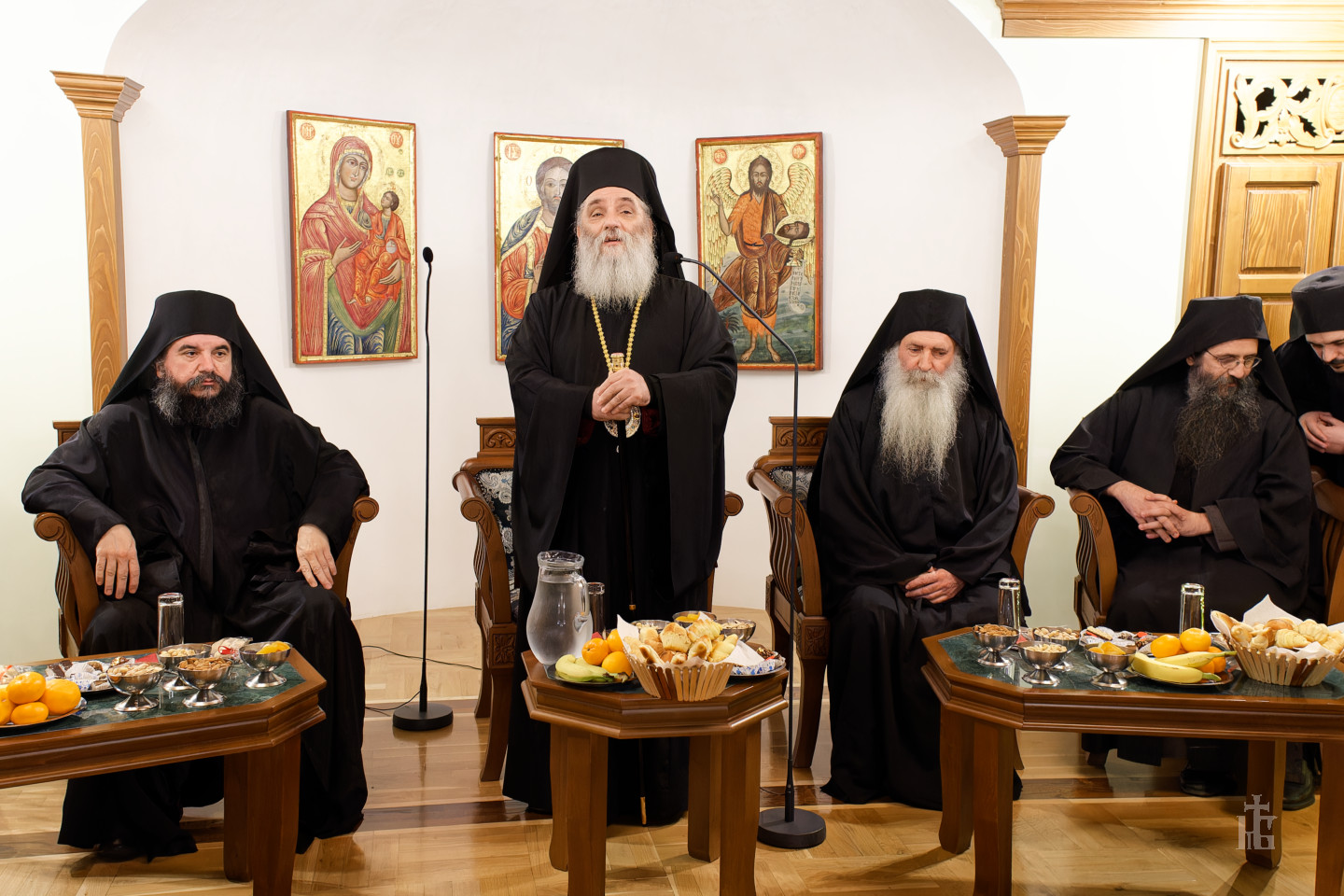
Lord Christ, my dear ones, accepted this divine kenosis, His self-emptying in utmost humility, out of love and desire to save and deify us. For He created man precisely for this sublime calling: to become one with Him, to make him a god by grace. Of all the creatures that God created in this beautiful world, which is like a kingdom, He made man as the king of all creation. Therefore, of all creatures, man is closest to God; human nature is closest to the divine. As we read in the Holy Scripture, He created man in His own image and likeness and placed him in the Garden of Eden. And Eden was not just a geographical place, but, above all, a way of life. And it was defined not so much by the beauties with which the first man was surrounded, as by the essential communion of man with God, by the opportunity for man to freely meet and communicate, to be in constant communion with his Creator.
However, from biblical history, we know that man became disobedient in Eden, not sufficiently understanding the freedom of choice given to him by the Lord. Divinely created, it was natural for man to become a god by grace. But then the serpent proposed to him to become a “god” in a different, inappropriate way. Simply put, man reached out to become a god by theft, through what was forbidden to him by his Creator. And he did so, transgressing God’s command. Such a proposal for theft from God did not happen only once, with Adam and Eve, but occurs throughout history with each of us. The same choice stands before all of us. The one and only correct way is to become truly gods by grace, choosing Christ’s path, the way of the cross, the path leading to resurrection and ascension with God; the other way is the rebellion against God, the Luciferian path, when, being deceived like the first Adam and Eve by the serpent, we think we are doing something good and believe that without God we can become gods, be free. And exactly then, when man falls away from God, real slavery occurs. Man without God, my dear ones, ceases to truly live, ceases to be a man. Like when, for example, a branch is cut off from a tree. It has nothing left but to wither, because it can no longer draw life-giving juices from the root and the stem. After all, Christ teaches His Apostles: I am the vine, ye are the branches; he that abideth in Me, and I in him, the same bringeth forth much fruit; for without Me ye can do nothing. If a man abide not in Me, he is cast forth as a branch, and is withered; and men gather them, and cast them into the fire, and they are burned (John 15:5-6). This shows us that life without God is empty, barren, without true happiness, without essential joy. A man can be happy only when he meets his Creator in love.
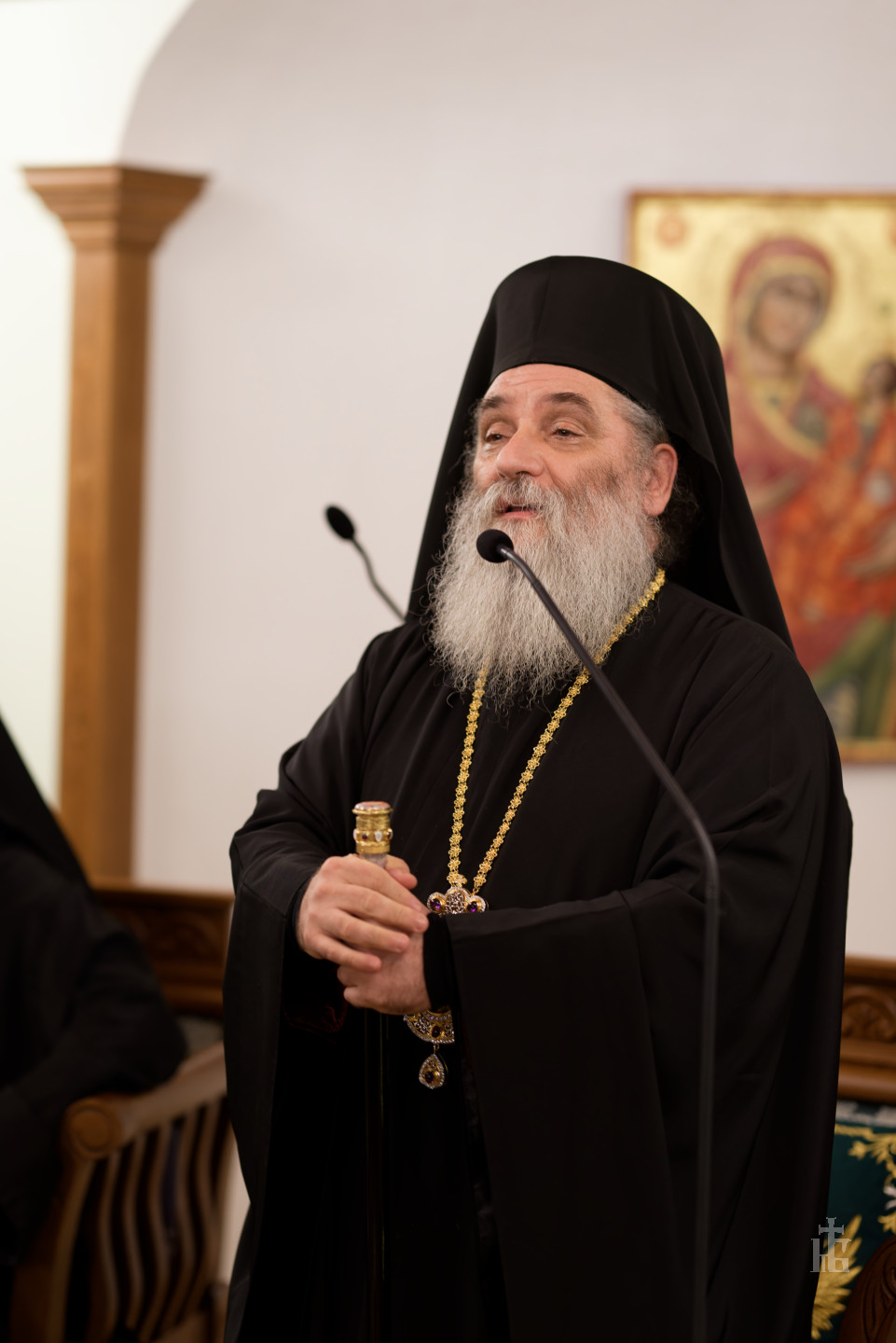
And behold, He, our Creator and God, came to meet us in humility; the Beloved came to be born in this world as the poorest of men. Not in a royal palace, not even in an ordinary house, but He was born in a shepherds’ hut, in a cave, and laid in a manger. In a place where animals slept. The manger was His cradle, the hay was His bed. He came in utmost humility to meet all of us, every individual. And in this time, He comes to all of us who are here tonight to stand vigil and meet Him, most of all through the Holy Communion of the Divine Eucharist.On my way here, the monks told me that we have many guests. And as always, I felt great excitement and gratitude for that. Because we did not inherit any of the things we have now. We did not inherit this splendor that you can see in the Monastery. But the walls and the inventory in the Monastery are not as important to me as this glow which I see in your eyes, the sparkle that I notice in your desire to be with Christ. Because once, not very long ago, the Monastery was empty. And not only this Monastery but also most of the sanctuaries in our country were empty. Yesterday I told the carolers who surprised me – and I think the brothers have already published it on the page – that when we came to the Monastery, we started thinking of vasious ways to attract young people to the faith. One of the ways to attract them for Christmas was the prayer vigil for the New Year’s Eve according to the new calendar. Because if we announced then that we would have a vigil for the Nativity of Christ, no one would have come. Such was, unfortunately, the spiritual climate in our society. Everyone celebrated superficially, materially, not in the church, but at home, because “the most important thing” for Christmas was to sit at the table at home. Yes, I agree, the festive meal is also necessary, but it is the last thing and is no more than just a natural end to the celebration, which follows after the Divine Table of the Holy Eucharist. But in Macedonia at that time for Christmas, it was more important than anything to just sit at the table and eat and drink. In the context of this, I remember a survey, somewhere in ’91/’92, when journalists asked foreign diplomats in the country how they celebrate Christmas in their countries. And all of them, the English, French, Germans, Americans that we had here, answered that in the morning they first go to mass, to the service, and then to a family lunch. When they asked our politicians, their reply was: “Christmas is a holiday for family gatherings and lunch.” Nothing more. No God, no service. They even immediately started telling the recipes and foods they eat for Christmas. So, the Eucharistic life was so forgotten among us. One went to church for Christmas just to maybe light a candle and for nothing else.
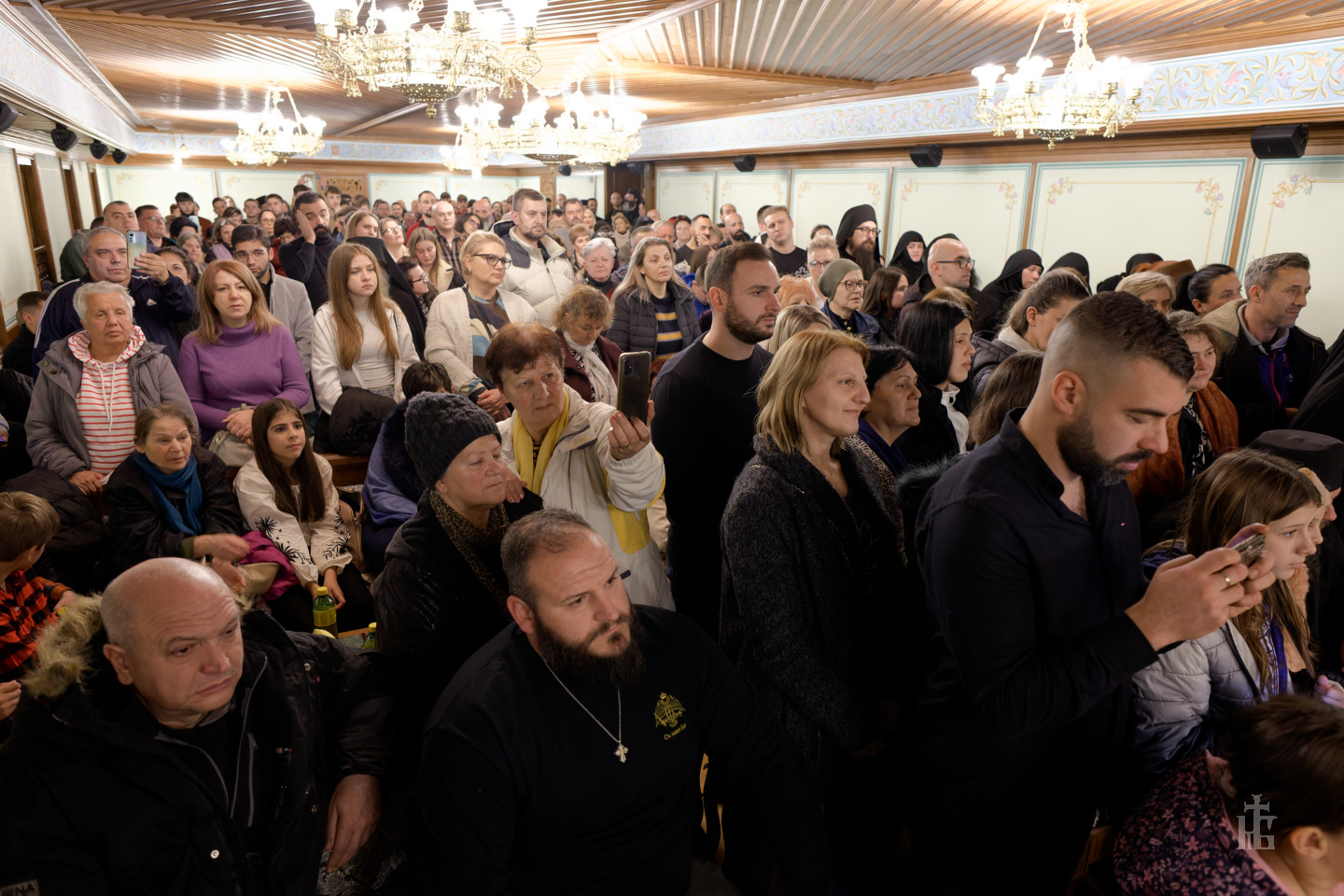
But let me go back to the reminiscence of the New Year’s vigil. Why did we take that feat? Because it seemed attractive to young people. For many of them, it was somehow degutating and boring to celebrate New Year in cafes, on squares, in coffee shops, without any sense and purpose. And when they heard that somewhere in a monastery New Year was celebrated in a different way, with some kind of vigil, it seemed interesting to them. Some even came out of pure curiosity and somehow with a mocking attitude: “What will the monks do now in the monastery for New Year? Let’s go and see.” And so they started to come, then they met the monks, got acquainted, and gradually, more and more young people entered the faith. When a sufficient number of people were introduced to the faith through the Monastery, both here and for the churches everywhere, we started to make vigils for Christmas. Next, you know what followed: the revival of Orthodox national traditions, such as singing carols, announcing the Birth of Christ with a cave – a custom that was preserved in Bitola and so on. I remember when we were little we didn’t know what the word spileon meant and the grandmothers told us it was an old word for a cave. Actually, spileon is an ancient Greek word and that alone indicates the antiquity of that tradition. Consequently, the malicius claims that the tradition with the Christmas Eve caves is some kind of novelty, newly invented, are completely false. The only thing new about them is the material the caves are made from, but the Christmas Eve processions with a Christmas cave are very ancient and the elderly people from Bitola remember them well. When I was a child, the caves were made of slats, tree bark, decorated with moss, with straw. My uncle, God rest his soul, made the most beautiful spileon for our Christmas carol group, and when we went from house to house, everyone admired how beautiful it was and generously gave us fruits and coins. Of course, inside the cave, there was always an icon of the Nativity of Christ.
Growing up and living with these ancient traditions in Bitola, when I arrived at the Bigorski Monastery of St. John the Baptist, we endeavored to revive and expand them. Our goal was for all children to rejoice and spread everywhere the joy of the Nativity of Christ. I believe children are so much like the shepherds in Bethlehem. It was to them that the Angels appeared, announcing: “I bring you good tidings of great joy, which shall be to all people. For unto you is born this day in the city of David a Savior, which is Christ the Lord” (Luke 2:10-11). This message was not proclaimed to King Herod, nor to the notables of Bethlehem, or to those in Jerusalem, but to the humble, simple, and kind-hearted shepherds, deemed worthy of a heavenly visit. The shepherds went, venerated the newborn God-Child, and were filled with heavenly joy and glory. This year, thousands of children throughout Macedonia and abroad, like the Angels of Bethlehem, announced to us: “The Eternal God descended and dwelled in the Virgin.” Let everyone know that Christ was born in time, in history. He who is eternal and uncreated along with the Father and the Holy Spirit, chose to humble Himself for us, to enter into time; to experience suffering, pain, and death. To prove His boundless love for us. And to unite with us, to make us part of His community. Our God is wonderful, my dear ones! Our God is a Trinity. Saint Basil the Great says that God is a community. Monotheistic religions criticize us, saying we believe in three gods. But they cannot comprehend the mystery and majesty of God – that He is love. For love to exist, community is essential. Saint John the Evangelist does not say “God has love,” but “God is love.” For He exists as one Community. Three Persons, one Essence; three Faces, one God. Amazing! Can anyone easily understand this? Not at all. No human mind can grasp it, just as we cannot comprehend the infinity of the cosmos. Scientists have come so far, investigating, exploring, calculating, but they cannot understand the cosmos’s infinity or its beginning. How can we understand God? How is He One, yet in three Persons? It is beyond human comprehension and is revealed only to the humble in spirit. It is important to know that God is love, functioning in perfect community. Throughout history, He has continuously revealed Himself to humble hearts, not allowing mankind to perish completely. In the end, He became one of us, our beloved Christ God, whose Birth we celebrate tonight.
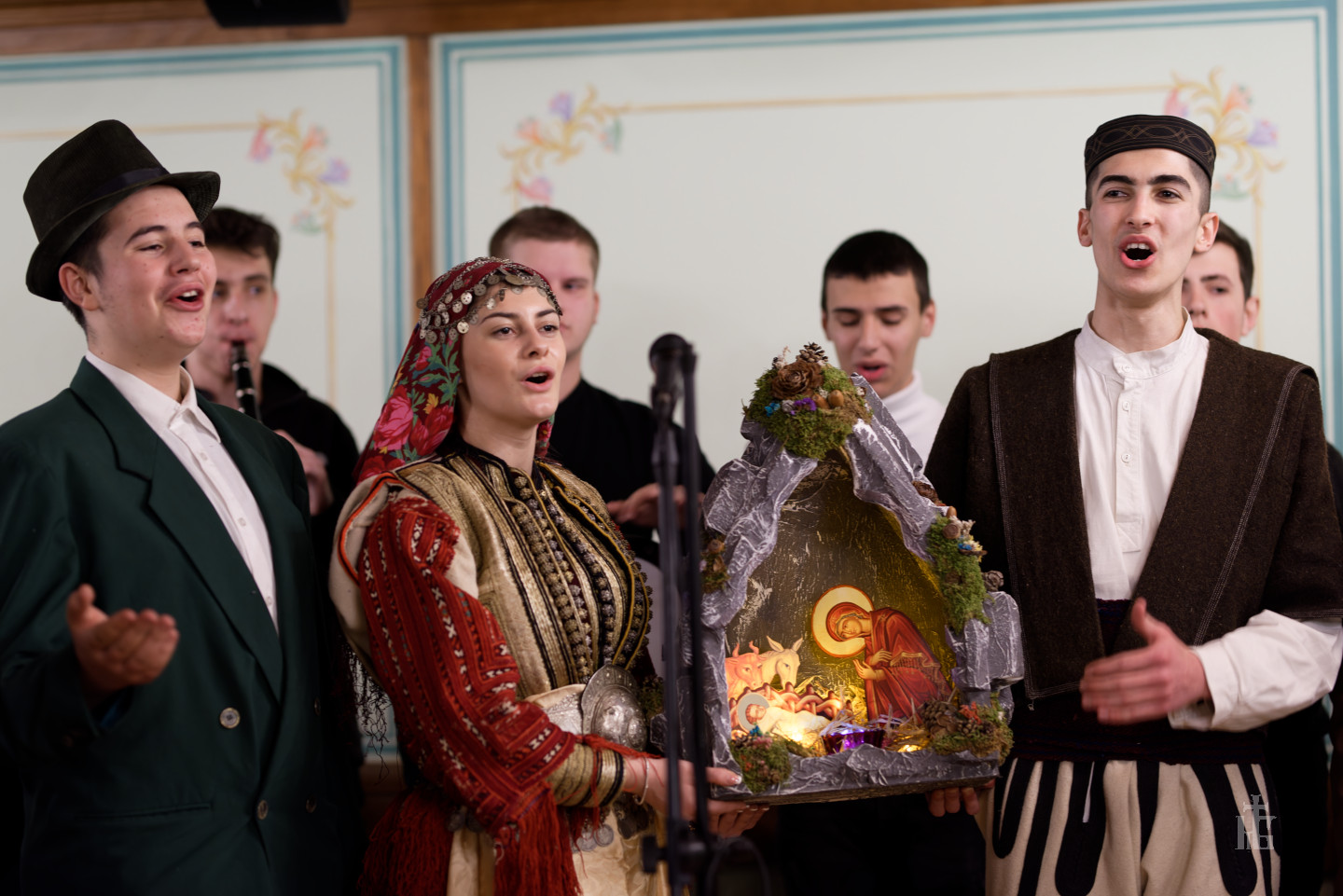
I am wholeheartedly grateful to the students of the “Ilija Nikolovski Luj” music school, who made this Christmas Eve so special. Honestly, I watched the videos of the flash mob you performed in the malls with the greatest love and, believe me, I cried. These songs you sing are ancient, created by the ancestors of the great Orthodox empire, the Eastern Roman Empire, to which we all belong. We have songs from Smyrna, Cappadocia, and even the “Eternal God,” which can be said to be a common Byzantine hymn, sung in several countries, including Romania. Then we have several written by our revivalists, the Miladinov Brothers and Marko Cepenkov, among others. We are all part of this broad and rich Orthodox tradition, belonging to the same civilizational cradle. And behold, the Lord has honored us, all together, with our united efforts, to revive part of this wonderful tradition. Let mi tell you this: know that you leave a very strong and beautiful impression on people with what you do, along with all the enthusiasts of the Christmas Eve processions throughout Macedonia. Yesterday, a young man working in Italy wrote to me: “Bishop, we have the best way to celebrate God. I haven’t seen anything similar to what we do here in other countries.” And I won’t hide it: this message made me very happy because it wasn’t always like that.
I wish you all a beautiful Christmas Eve, a good vigil, contemplation, and meditation on God. Let us immerse ourselves tonight in the theology that springs from the wonderfully beautiful poetry written by the Holy Fathers for the Nativity of Christ. And most importantly, to meet Christ and keep Him in our hearts until the end of our lives. This way, we will be the richest people, for He is the greatest treasure we can receive, not only for this world but also for the next. May you be blessed and have a wonderful Christmas!
